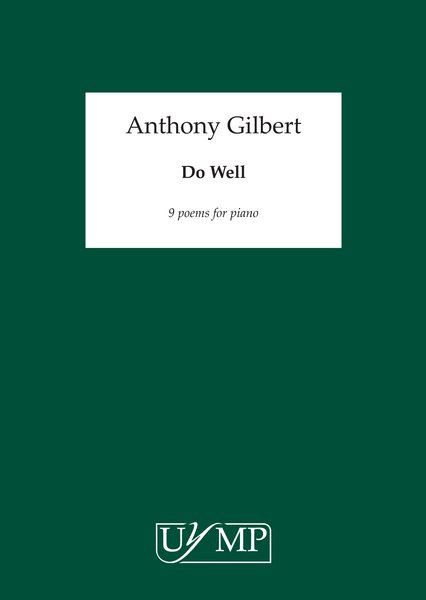9 poems for piano:
1. Chatkwell
2. John's Peal
3. Toll
4. Spaniel
5. Farewell
6. Speedwell
7. Duelo
8. Swell
9. Propel
These nine miniatures form an open-ended series of previously unpublished short pieces, each representing a significant friendship or event in this composer's life. The subitle 'poems' is simply to draw parallel with the work of its overall dedicatee, the Lancashire-born Tasmanian poet Sarah Day, whose poetry has set in motion several of Gilbert's more recent pieces. The overall order of performance is not fixed, and pieces may be omitted fom any concert prformance, though the composer feels that the first and last are most suited to begin and end a continuous sequence.
Chatkwell was commissioned by Alison Cox for the 2009 Commonwealth Resounds! festival, held in Trinidad and Tobago. It borrows some of its line, complete with voice-breaks, from a Bangladeshi chatka folksong heard in the fishing community, and progresses, via a rowing rhythm, to a sudden storm. As its modified title suggests, it could be played as the opening piece to the second half of a recital.
Toll, also written in 2009, was the composer's response to the sudden, tragic death of oboist and publishing colleague Pete Joyce. It is a simple, deeply-felt elegy.
John's Peal was the earliest in this group of pieces to be written, in this case for a concert in 1988 to celebrate the 60th birthday of Sir John Manduell, CBE, distinguished founding-Principal of the Royal Northern College of Music, Manchester, who retired from that post in 1996. It starts hesitantly, but soon a long, flowing line unfolds, creating a set of continuous variations on re-assembled opening material, by means of simple change-ringing patterns. Elements of plainchant peep through on the way to a bright climax, which then subsides to an open ending.
Spaniel (yap-trip) was written in 2009. Gilbert loves wildlife, but wild pet dogs do not fall into that category, especially when the noise they make interferes with creative concentration. So this is the composer's musical response to one such neighbourhood nuisance!
Farewell, another elegy, was written in 2006 for a concert in memory of Mark Ray, Head of Keyboard Studies at the Royal Northern College of Music until suffering a fatal boating accident while on tour in the United States that year. It rocks gently back and forth around the focal pitch D (Ré), and ends with an abrupt cut-off.
Speedwell, 'for one's flighty, flowery friend', is a piece almost entirely in the treble register, flying from one 3-part chorale-phrase to another without reaching any definite conclusion. It also dates from 2009.
Duelo (Spanish for 'I grieve'), is an elegy to David Drew, highly-respected writer, editor and commentator on 20th-century music, whom the composer had known since 1959 and who died tragically fifty years later. Its bell-chimes, again on D, pursue a gentle, ever-slowing processional pace, rising midway and fading thereafter.
Propel, from 2010 and thus the most recently-written piece in the sequence, is dedicated to David Ellis. As the title suggests, it is driven by its own energy at high speed, with brief hesitations, through varying colours of light and shade to a wide-open non-ending on D-flat and E – a further hesitation, I suppose. The whole piece is in the treble clef.
Swell, written in 2003, is a tribute to the unflagging commitment of composer, music-educator and animateur Alison Cox, O.B.E., and as the title suggests, its overall structure and texture is that of waves of energy. In a sense it is also prophetic, since two years later Ms Cox embarked, in conjunction with her future husband, upon a long series of festivals for young performers, all overseas in Commonwealth countries.


